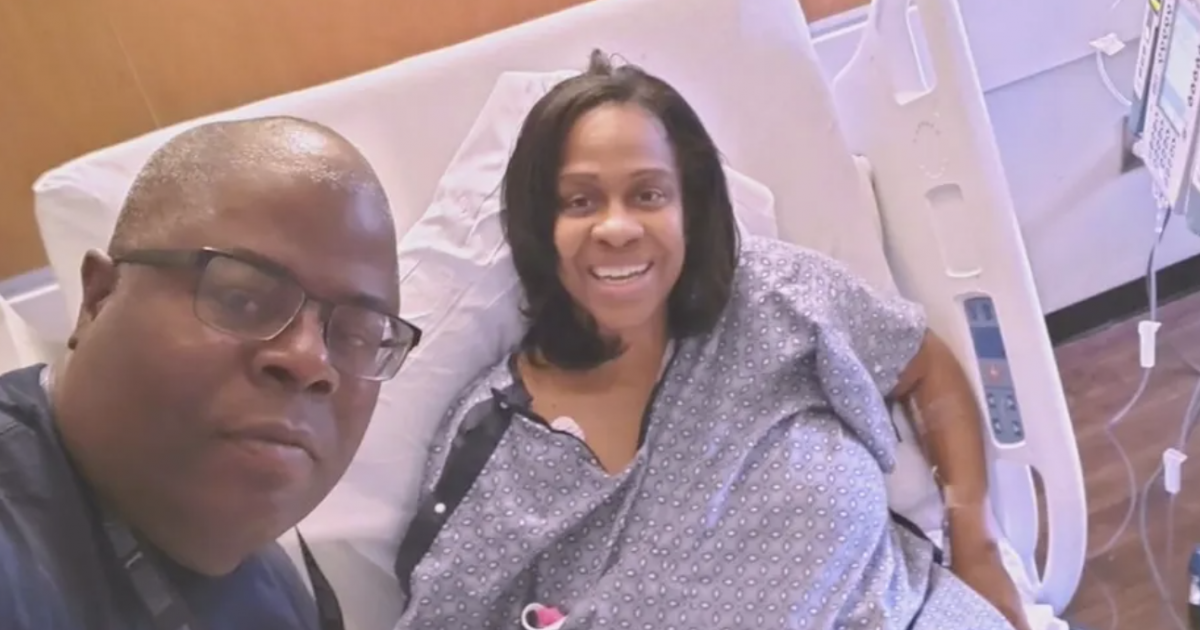TV Anchor Turns The Camera On Herself Amid Stomach Cancer Battle
- Beloved Atlanta television anchor Aungelique Proctor is battling stomach cancer after months of feeling fatigue and exhaustion that at one point left her unable to climb stairs. She waited, however, to see a doctor until after her three daughters had left home to return to college.
- The Fox 5 reporter managed to catch the disease while it was still stage II, and is now taking a once-daily oral chemotherapy pill that will hopefully shrink her tumor before surgery to remove the organ next summer.
- Proctor displayed the most common symptom of stomach cancer when her blood test revealed her hemoglobin levels were low. Most individuals diagnosed with stomach cancer will have bleeding that causes a drop in the level of red blood cells.
The longtime member of the Fox 5 family revealed her diagnosis in an interview on Monday, saying that she first started to grow concerned about her health when she started to feel rundown over the summer.
Read More
Related: 'Empire' Actress Taraji P. Henson Says a Stomach Cancer Scare Led Her to a Healthier Lifestyle
Proctor is also a working mom, which is why she found herself too busy to visit a doctor at the first signs of exhaustion.
That was over the summer, and at the time, she was busy preparing to send her three daughters off to college.
“So, once I took them to school, I said, ‘Now it’s time for me to focus on me,'” says Proctor. “And I started calling doctors to get checked out because my tummy didn’t feel right and I was tired. I didn’t have much energy to even walk up the steps.”
Proctor then visited her doctor for tests to determine what could be causing her to feel so tired.

Her thyroid checked out fine, as did her heart, but a blood test revealed a dangerously low level of hemoglobin which prompted a panicked call from her doctor.
Hemoglobin levels tend to be lowest when experiencing internal bleeding, so Proctor’s doctor instructed her to go to an emergency room immediately out of an abundance of caution.
“That’s when I learned there was a tumor,” says Proctor. “I had bleeding ulcers at the top. But under the bleeding ulcers was a tumor.”
As shocking as the tumor may have been, Proctor did catch the disease at a point where a variety of treatment options were available.
She is electing to try to shrink the tumor by taking the oral chemotherapy medication Gleevec (imatinib) which only requires her to take one pill daily. The aim is for this to shrink the tumor — a gastrointestinal stromal tumor (GIST) — before having surgery to remove it next summer.

This straightforward treatment plan helped ease the shock of the diagnosis, but Proctor notes that there is one part of the cancer journey she struggled with more than any other – breaking the news to daughters Nia, Maesa and Asha over Zoom.
“That was really tough. [My husband] Max has been really supportive and really strong. The girls were a little bit more stunned and teary-eyed. One of them has confided she feels like she’s losing her mother. And I said, ‘but you’re not,'” recalls Proctor, who admits she has yet to shed a tear.
However, she is aware that this will not be an easy battle but is ready for whatever comes her way.
“I’m very spiritually grounded,” notes Proctor. “I have an incredible network with Max and the girls, and I’m from Atlanta. My extended family is here. My church family is here.”
And since so many in Atlanta are part of her family, and she has told many of their stories, it seemed only fitting that she turned the camera on herself this time.
“I just always seek truth and always being upfront. I’m a transparent person,” explains Proctor. “And so now I think it would almost be hypocritical if I didn’t share what’s happening with me.”
Proctor says she is “feeling fine” and “feeling good.” Her doctor even encouraged her to return to work.
“My doctors said, ‘We think you should go back to work. You’re healthy,'” says Proctor. “And they said their patients who sort of normalize things do better.”

So she will continue to share her reporting while occasionally turning the camera on herself for these next few months. Proctor says that she feels a responsibility to do this because it impacts others battling cancer in silence.
“Through me sharing my story and my fight against cancer, I might be able to help somebody else sort of remove the stigma of, ‘this is something we shouldn’t talk about,’ or ‘this is something you fight quietly in the dark alone,'” explains Proctor.
“I plan to fight it in the open, and if it’s God’s will, I will win.”
Stomach Cancer Symptoms & Risk
Aungelique Proctor displayed the most common symptom of stomach cancer when her blood test revealed her hemoglobin levels were low.
Most individuals diagnosed with stomach cancer will have bleeding that causes a similar drop in the level of red blood cells.
Other symptoms of the disease include:
- Trouble swallowing
- Post-meal bloating
- Constantly feeling full
- Heartburn
- Indigestion
- Nausea
- Pain the stomach
- Sudden, inexplicable weight loss
- Vomiting
Stomach cancer currently accounts for just less than two percent of new cancer diagnoses in the US, and according to the American Cancer Society is more prevalent in women than men.
There will be 26,560 new cases of stomach cancer in 2021, with 16,160 of those cases diagnosed in men and 10,400 in women.
SurvivorNetTV Presents 'How Not To Get Cancer: Diet' The Power of Prevention & Healthy Habits
Is Stomach Cancer Genetic?
Inherited cancers account for five to ten percent of all diagnoses, with researchers having identified over 50 inherited cancer syndromes.
One of those is a form of stomach cancer known as hereditary diffuse gastric cancer, marked by a genetic mutation inherited at conception known as CDH1.
The good news is that because researchers have identified this genetic mutation, individuals who have a history of stomach or other cancers in their family test to learn if they are at risk.
After genetic testing, those who discover they do have this mutation can then opt to have a prophylactic gastrectomy, which eliminates their risk of stomach cancer.
It is preferable that individuals who undergo the procedure be between the ages of 20 and 30 because it is a major surgery that removes the entire stomach and can have a lifelong impact on their eating habits.
There are now ten forms of cancer that researchers have acknowledged can be inherited, identified the genetic mutation that increases the risk of diagnosis, and determined a treatment option that allows individuals to eliminate their risk and join the growing number of previvors in the cancer community.
Those are:
- Stomach cancer
- Breast cancer
- Ovarian cancer
- Colon cancer
- Thyroid cancer
- Prostate cancer
- Pancreatic cancer
- Melanoma
- Sarcoma
- Kidney cancer
For individuals at risk of stomach, kidney, or pancreatic cancer diagnoses, this testing is particularly vital given how difficult it can be to diagnose those three forms of the disease, which doctors do not test for in patients.
Genetic Testing: What It Is And Why It Is Important
Learn more about SurvivorNet's rigorous medical review process.

